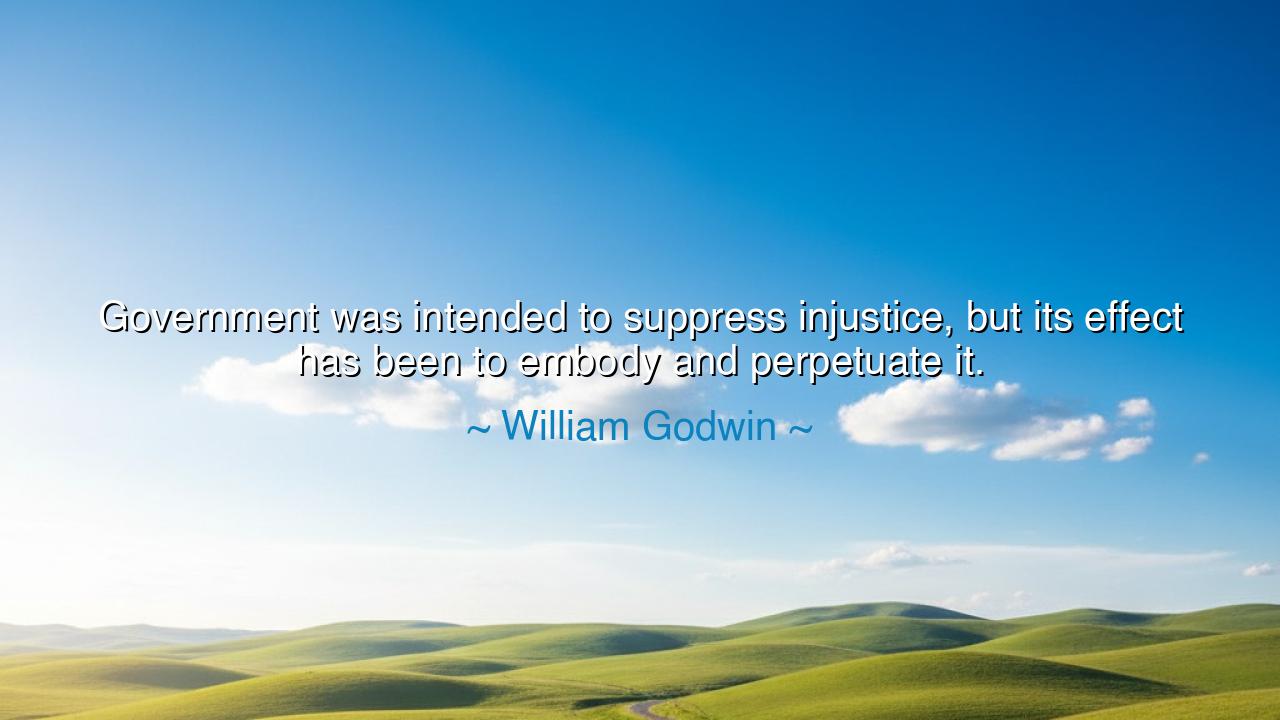
Government was intended to suppress injustice, but its effect has
Government was intended to suppress injustice, but its effect has been to embody and perpetuate it.






When William Godwin wrote, “Government was intended to suppress injustice, but its effect has been to embody and perpetuate it,” he spoke as a prophet of liberty — one who saw, with painful clarity, how the hand meant to protect can become the hand that wounds. His words rise from the 18th century, a time of revolution and reform, when nations across Europe were awakening to the promise of reason, equality, and freedom. Yet amidst this awakening, Godwin perceived a grim irony: that the very institutions built to guard justice often transform into engines of oppression, defending privilege, enforcing inequality, and turning the idea of law into a shield for the powerful.
Born in 1756, William Godwin was among the first great political philosophers of anarchism, though his vision was not one of chaos but of moral order arising from conscience rather than coercion. He wrote during the Age of Enlightenment, when monarchs were falling and constitutions were rising, when humanity believed that reason could replace tyranny. Yet Godwin saw that even the new governments, cloaked in the language of liberty, carried within them the same disease — the desire to control rather than liberate, to preserve authority rather than challenge it. His words expose a timeless paradox: that power, however noble its beginning, tends toward corruption, and institutions born to fight injustice often learn to feed upon it.
History is filled with the echo of Godwin’s warning. The French Revolution, which began with cries of Liberté, égalité, fraternité, soon descended into terror. The guillotine became the new throne, and the republic that had risen to destroy kings became its own despot. So too in modern times: governments that promise equality erect systems of surveillance, exploitation, and endless war. Godwin saw this pattern not as accident, but as the natural consequence of entrusting virtue to power. He believed that justice cannot be maintained by force — it must live in the heart of free and thinking individuals. Once the state begins to dictate morality, it ceases to be a guardian of justice and becomes its usurper.
There is an ancient reflection of Godwin’s insight in the fall of Rome. The Republic had been founded on the ideal of justice for the people — laws to restrain tyranny, senates to temper kings. But over time, those very structures hardened into an empire of conquest and privilege. What had begun as a system to suppress injustice became the machinery that perpetuated it. The senators who once defended liberty became defenders of wealth; the soldiers who fought for honor became tools of oppression. Rome collapsed not from foreign invasion alone, but from the rot of hypocrisy within — from the loss of its founding soul.
In the style of the ancients, we might say that Godwin was warning humankind against the arrogance of believing that justice can be institutionalized. True justice, he argued, flows from the conscience of individuals, from reason, compassion, and self-governance. When these fade, no law, no constitution, no bureaucracy can save a nation. A just society cannot be built by decrees; it must be built by hearts that revere truth more than comfort, and conscience more than command. In this way, Godwin’s philosophy stands as a torch for all ages — a reminder that governments are only as moral as the people who sustain them.
His message is deeply emotional because it exposes the tragedy of human intention. We build governments to protect the weak, yet they often crush the very souls they swore to defend. We pass laws to ensure fairness, yet those laws are bent by wealth and influence. Godwin’s lament is not a cry of despair, but a call to awakening — to remind us that vigilance is the price of freedom, and that morality belongs not to the state, but to the human spirit. For when citizens surrender conscience to authority, they create the monster that enslaves them.
The lesson of William Godwin’s words is clear and enduring: never worship power, even when it speaks in the name of justice. Governments must be watched, questioned, and restrained, lest they become what they were made to fight. Each generation must renew the moral flame of liberty — not in laws alone, but in lives lived with integrity. Let every man and woman remember: justice is not enforced by power; it is born in truth.
Therefore, take this teaching as the ancients would — as both a warning and a hope. Build your laws, but never forget your conscience. Trust your leaders, but hold them accountable. And when government forgets its purpose, remind it with courage that it was made to serve, not to rule; to protect, not to command. For the day the state becomes the author of justice instead of its servant, that day injustice will wear the crown — and freedom will be but a memory whispered by the brave.






AAdministratorAdministrator
Welcome, honored guests. Please leave a comment, we will respond soon